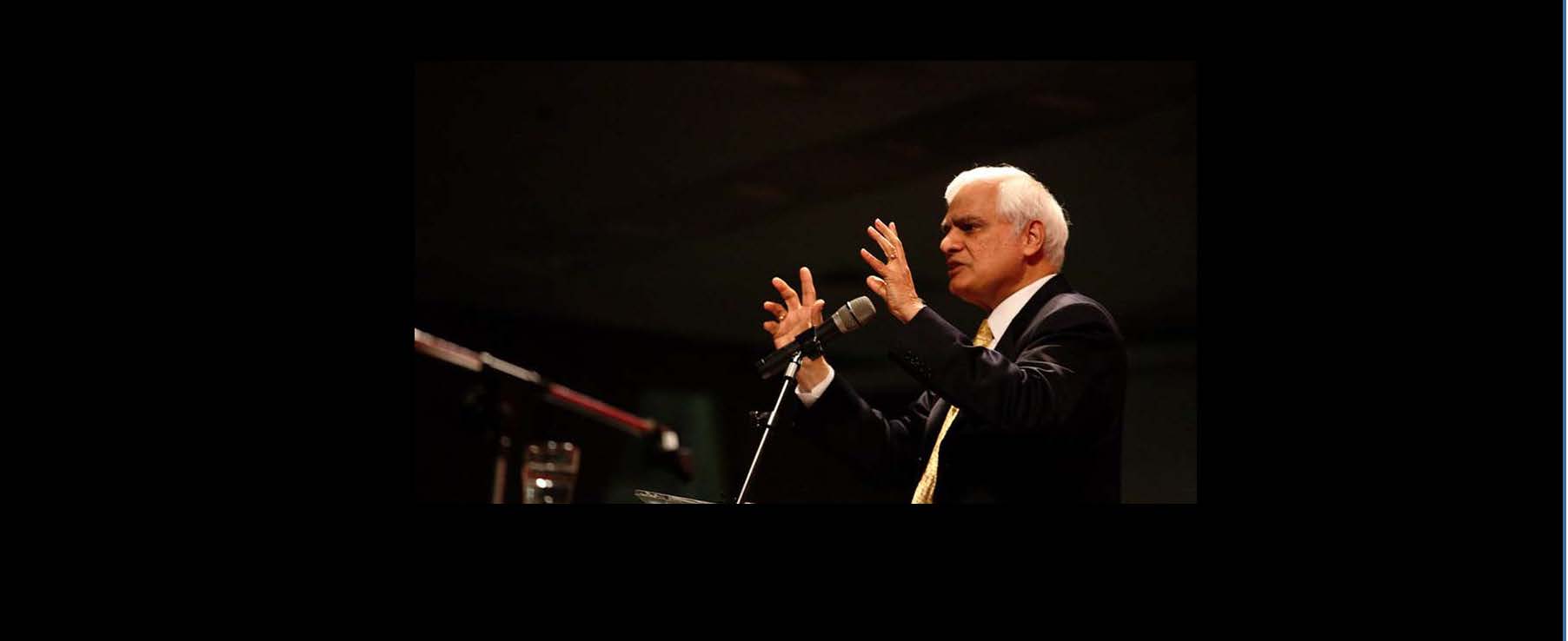Sobering Lessons from the Ravi Zacharias Scandal (Part 1)
Stimulating lectures on university campuses serving as bastions of a liberal worldview.
Stirring debates with prominent atheists and scholarly representatives of other faiths.
Soul-strengthening sermons from large church pulpits and Christian college chapels.
Incisive arguments in best-selling books for the plausibility of Christian beliefs.
Those are the venues through which I’ve learned from Ravi Zacharias over the years, until his death from cancer in May 2020 at the age of 74. Based on my observation, he communicated with exceptional clarity and persuasive passion. His logic in explaining the reasonableness of the Christian gospel buttressed my faith on several occasions, helping me deal with nagging doubts. When he spoke, he “kept the main thing the main thing,” often ending his messages with an appeal to the cross where Jesus died for our sin. God’s Spirit used Ravi to prompt a multitude of people, probably tens of thousands, to put their faith in Christ. And Ravi usually defended the faith with a winsome, loving spirit, unlike a few apologists I’ve known who are more acerbic in their attitude. Many opponents he debated respected him for the personal warmth that he demonstrated toward them.
When I read about the moral scandal that erupted after his death, I wept. Despite many soul-nourishing insights I learned from him over the years, the most unforgettable, impressive lessons he taught me emanated from his grave.
Damaging Disclosures
A few months after Ravi’s death, the penetrating light of a formal investigation exposed sexual misconduct that had occurred over a period of years. Numerous times he scheduled massage therapy sessions alone with women, in the U. S. and overseas, despite his public claim that he had never been alone in a room with other women. A number of therapists confirmed his frequent efforts to receive “more than a massage,” reporting inappropriate touching and sexual advances. Investigators found over 200 selfie-style pictures of young women on his cell phone, including nude photos. Ravi misappropriated ministry funds to pay for schooling and living expenses for a few of the women toward whom he acted in an abusive manner. According to one of the women, Ravi explained that she was a “reward” for his lifetime of faithful, exhausting ministry. Investigators also found inappropriate messages written by Ravi to women that suggested romantic or sexual involvement.
My purpose isn’t to lambaste Ravi and add yet another “How could he?!” that chips away at his legacy. I’m too conscious of my own indwelling sin to look down my nose at any Christian leader who falls off his pedestal and crashes. No, my intent is to share two truths, both rooted in God’s Word, that His Spirit impressed upon me as I read the details of Ravi’s scandalous behavior. Others have written effectively about the need for more personal and organizational accountability, so I won’t directly address that issue. (Except the next post in this series will explain why accountability is needed, why there’s danger in too much privacy for any Christ follower.)
Today, I’ll disclose the first lesson through which God’s Spirit has issued a warning to me. My next post will explain the second vital insight.
Both scare the daylights out of me.
The Snare of Success
Imagine you’re a pastor with strong gifts of teaching and leadership. You communicate passionately, with exegetical soundness. As a result, your church has tripled in size since you took over as pastor. A lot of the growth is due to new conversions, not transfer growth. You receive numerous compliments for your preaching. Since the inception of this ministry, you’ve prayed regularly and fervently for these results.
Thank God with all your heart for fruitfulness. Also, beware. His answers to your prayers present a clear and present danger.
Or imagine you’re a business entrepreneur. A decade ago you launched a new business from scratch. As a conservative Christian, in addition to hard work and long hours, you asked God to bless your endeavor, to grace you with managerial know-how. You yearned to represent Christ and biblical values well in the marketplace. Now you employ over 20 people and you’ve branched out to a second location. You didn’t expect to make this much money so soon.
Keep giving God the credit for your success. Increase your giving to “Kingdom enterprises” as your income escalates. Also, stay alert. Be afraid. The success with which God has blessed you could result in a gradual erosion of character and values.
Whether the realm of success is your church ministry, representing Christ in the marketplace, academic achievement or the spiritual blessing of your adult children following Christ, rivet this truth deeply into your consciousness: God’s blessings pack the potential to trip us, spiritually speaking. Of course, the problem isn’t with the blessings…..it is inside each of us.
I’ve read a number of news articles, both secular and Christian, about the scandal involving Ravi. There’s no indication that his subversive behavior occurred from the beginning of his public ministry. Apparently, he lived most of his years circumspectly, his private life matching his public message. Undoubtedly, he asked the Lord for effectiveness of his speaking and writing outreach. Ravi sincerely wanted people to put their faith in Christ. And what an answer to his prayers: a sturdy platform of gospel outreach that few Christian leaders in the world could match, including well-attended public speaking venues and the publication of over 30 books.
Then somewhere along the line, probably a decade or two before his death, the erosion of his heart began. All the recognition, the public spotlight, the media attention and outpouring of praise for representing Christ so persuasively stirred the embers of pride that reside in every man’s heart. As the boundaries of his influence kept expanding, that pride flickered into a flame. He began fueling instead of resisting the innate lusts of the flesh that wage war within the spirit of every Christian. Perhaps he didn’t heed the fact that prominent people in ministry live with a target pinned on their backs, that public renown is always accompanied by more pervasive attacks of spiritual warfare. Since he had spent himself to the point of exhaustion for the gospel, Ravi privately rationalized indiscretions and began calling anyone who questioned his integrity “nasty people” and pawns of Satan.
A biblical illustration of what happened to Ravi is Uzziah, the king of Judah who reigned for 52 years. In his early years, “he did right in the sight of the Lord” (2 Chronicles 26:4). Uzziah “continued to seek God….and as long as he sought the Lord, God prospered him” (26:5). God helped him to establish a strong defense against enemies of Judah, including an elite army of over 307,000 soldiers. Under Uzziah’s reign, the nation prospered economically. “His fame spread…for he became very strong” (26:8).
But (ah, you knew that was coming) “he was marvelously helped until he was strong, but when he became strong, he was so proud that he acted corruptly, and he was unfaithful to the Lord his God” (26:15-16). Uzziah entered the temple to burn incense to the Lord, a duty that God had clearly given only to priests, not to kings (Numbers 16:40). When 80 priests tried to restrain him from burning the incense, Uzziah became enraged. That’s when God instantly zapped him with leprosy. Uzziah was banished from the throne and died a leper. Perhaps he, too, rationalized disobedience to God because he had followed Him and served Him so faithfully in the past. Subtly, gradually, he began reading his own press clippings and thought he was an exception to some things God had forbidden. (Don’t miss the irony that Uzziah’s disobedience involved his participation in a religious act.)
Uzziah’s success as a king, Ravi’s success as an evangelist and apologist, and any success God has providentially given to you and to me are not inherently wrong. But we must not be blind to the tendency for our heads to swell due to the blessings we’ve received. I can’t help but recall what the late pastor Ron Dunn said: “The primary hindrance to your future usefulness to God may be the fact that you’ve been used.”
The essence of what God’s Spirit is saying to me is this: “Oh Terry, please don’t make a similar mistake. Don’t assume that God will treat your sin flippantly because you’ve sought Him diligently and served him fruitfully over many years. Perhaps your best defense against moral erosion begins with a keen awareness that erosion is a possibility within you. Some answered prayers pose a danger. Success intoxicates, even when God the Father authors your success.”
Ponder long and hard this remark from pastor and author Charles Swindoll: “For every person who fails the faith test posed by adversity, I’ll show you a hundred who fail the test of prosperity.”
When God blesses us, moral erosion is not inevitable. Not every well-known Christian leader falls into grievous sin. Media outlets flash headlines about those who fail, yet seldom write stories about the ones who don’t. Perhaps the best known example of a renown leader who finished well is Billy Graham.
Bu whether our success is in vocational ministry or in other realms of endeavor, we’re more vulnerable to moral decay if we don’t guard against the possibility of failure. The key to avoiding a Ravi-like spiritual decline is knowing our hearts and the innate potential for horrific sin that lies dormant within each of us.
In my next post, I will elaborate on the factor that made Ravi susceptible to scandalous sins, and what makes us vulnerable as well. It is a biblical doctrine that the contemporary church needs to reclaim and to teach.
Application Ideas
- Pray regularly for Christian leaders: your local church staff, missionaries your church supports, as well as well-known authors or speakers you respect. Select a different name each week and ask the Lord to keep him or her morally pure and to keep his or her heart humble.
- Meet with your spouse and children for the express purpose of expressing gratitude for God’s blessings and answers to prayers involving members of the family. Discuss together: How can we as a family keep from taking God’s blessings for granted? If we were to become proud over the visible ways God has blessed us, how would it show?
- With your church staff and board, recite the concrete ways God has blessed you as a congregation. Take unhurried time to offer prayers of gratitude and praise for what He has done and is doing among you. Discuss: what can keep us as leaders from becoming proud over God’s blessings on our church?
- This link should take you to the 12-page report of the formal investigation into Ravi Zacharias’ sexual misconduct.
https://www.courthousenews.com/wp-content/uploads/2021/02/zacharias-report.pdf
If you read the detailed investigation into Ravi’s behavior, go next to the story of King Uzziah in 2 Chronicles 26. Look for specific parallels between the story of Uzziah and that of Ravi Zacharias.
And be very afraid.





0 Comments